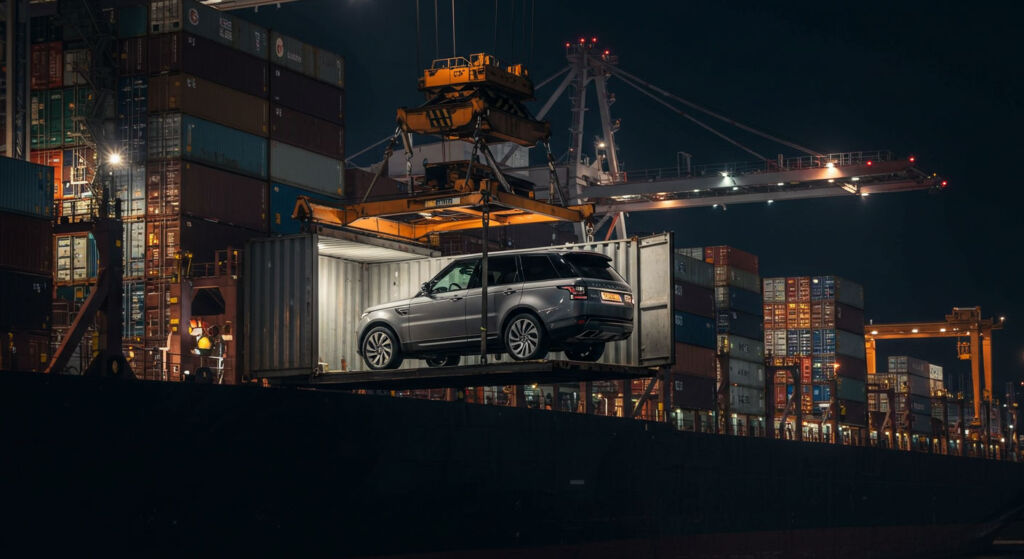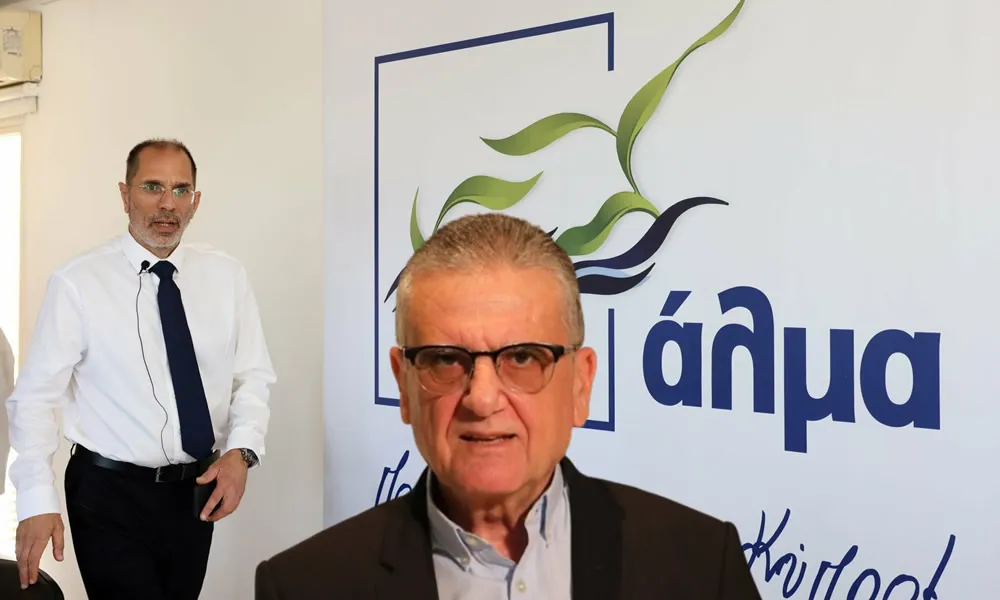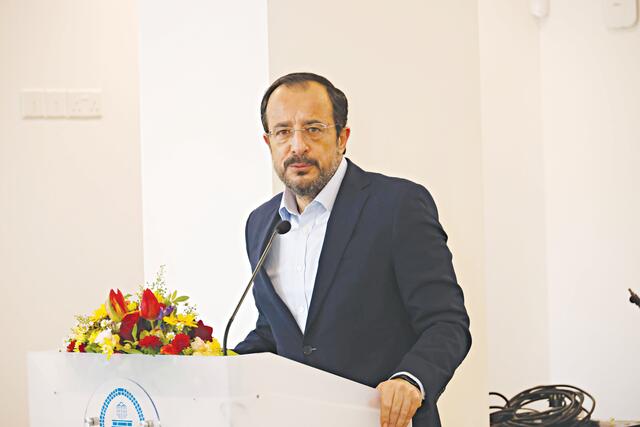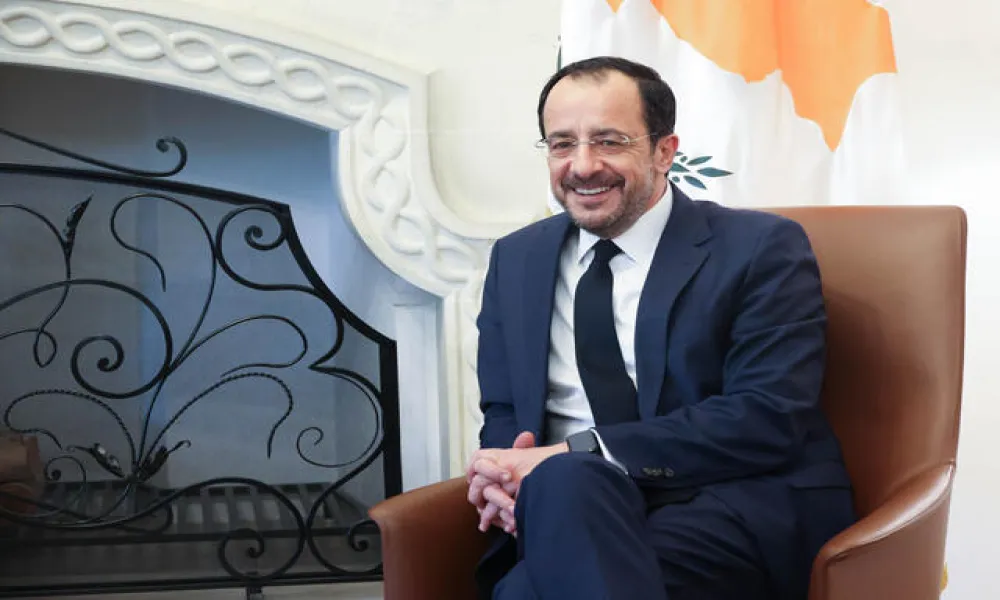Olive Pits
We read President Christodoulides’ interview in the Financial Times with genuine interest, and a touch of shock. Especially the part about Donald Trump. “Europe should take advantage of Trump’s renewed interest in the Middle East and Cyprus’ close ties with the region to strengthen its relationship with the United States,” said the President.
He added that “aligning more closely with the American President on regional issues is the way for Europe to remain an ambitious global power.” The line that followed, however, sounded like pure flattery: “Some leaders disagree with President Trump on certain issues. Personally, I don’t think it’s about agreeing or not. He’s the President of the United States. We must find a way to work with him. In our region, he’s the leader, and we’re seeing positive developments thanks to his leadership.”
He even gave two examples: “When the Iran-Israel crisis broke out, it was Trump who solved it. Or now with Gaza, he presented a plan, not ideal, but he put something on the table.” He didn’t say how he solved them, of course, in both cases, it involved thousands of bombs and missiles. On Politis’ website poll, 54% of Cypriots said Trump’s involvement in the Cyprus issue would be positive, 38% negative, and 8% didn’t know.

Blame Games
In the first part of CyBC’s (RIK) survey on the invasion, there was an intriguing question about the responsibility of certain countries. Cypriots were asked: “From what you know or have heard, would you say that the stance of some countries favoured the Turkish invasion in 1974?”
Top of the blame list: the British with 87%, followed by the Americans with 84%, and Greece third with 77%. When asked about internal responsibility, the Athens junta came first with 41%, followed by EOKA B and Grivas with 34%, and Archbishop Makarios with 15%.
Oddly, Turkey and the Turkish Cypriots received just 2%. One wonders, did those who took the survey get their information from Çavuşoğlu’s briefings, or perhaps they swallowed Ankara’s propaganda whole.
Sensitive Coverage
All media have agreed to refrain from covering suicides. Such coverage has never been, and can never be, just another story. It’s a delicate balance between the public’s right to know and the media’s duty to protect human life.
International guidelines are clear, excessive exposure, detailed descriptions, dramatic headlines and “breaking news” tones can trigger copycat behaviour, the Werther effect, especially among vulnerable individuals.
In short, reporting a suicide can act as a spark for someone already in crisis. Responsible reporting, without details or dramatization, reduces that risk. The focus must be on prevention and helplines. Parents, teachers and army officers must remain alert, and journalists should recognise that “shocking details” and “tragic twists” serve no purpose other than inflicting more pain on a grieving family.

Luxury Theft
What’s going on in this country? Every year, 200,000 luxury cars are stolen from the UK, and around 20,000 of them end up in Cyprus, most eventually bound for Africa. The Economist investigation didn’t clarify how many end up in th enorth and how many are sold in the south.
Apparently, many arrive sealed in containers, some even marked as damaged so they can be passed off as “spare parts.” Still, it explains the mystery of how so many luxury cars circulate in Cyprus, and why people wonder who can afford a €100,000 vehicle. When it’s stolen, of course, the price drops, and even the poor can play princes.

The Fidias factor
In the early polling before the 2024 European elections, Fidias didn’t even appear. About a month before the vote, he suddenly emerged at 10%, then shot up to 17% within days.
In the first polls ahead of the parliamentary elections, Fidias and his party scored around 6%. Some argue it should be higher, a notable drop compared to the European election result. Others counter that more parties are contesting the national race and that all parties are starting low, with room for a late surge.

Odysseas fallout
In Reporter’s latest poll, Odysseas Michaelides’ ALMA party lost two points compared to the previous survey. Perhaps that’s the “Chasapopoulos effect”? The former associate seems determined to hit his ex-boss hard, especially if he releases proof that Michaelides himself was behind posts on the “Support the Auditor-General” page.
Before the Supreme Court, Michaelides swore he had nothing to do with the offensive comments and personal attacks made there, comments managed, incidentally, by Chasapopoulos. The question now is whether Chasapopoulos has evidence, such as messages directly from Michaelides. Similar evidence, after all, surfaced in the Christodoulides case, where WhatsApp messages instructed friends and associates to attack political rivals.
Clickless Future
Despite growing public interest in Artificial Intelligence (AI) tools like ChatGPT, there’s still no solid data showing how traffic to Greek and Cypriot news sites has changed.
International analyses show direct traffic from chatbots remains low (around 1%), but AI-generated answers in search results have drastically reduced clicks to news pages, in some cases by dozens of percentage points.
Google’s AI summaries now give users the answer directly in search, meaning fewer clicks to the source article. In some studies, when Google places an AI summary at the top, the top-ranking page can lose up to 70-80% of traffic for that query. (That doesn’t mean total traffic drops by 80%, but that keyword does.)
In Cyprus, Google has begun paying some royalties to publishers. ChatGPT and similar AI tools have not. Meanwhile, the Union of Journalists is still fighting with SEK and PEO over cost-of-living allowances, seemingly unaware that soon there may be no journalists left to represent.

Reshuffle Talk
And once again, the parrots are talking reshuffle. We say, damned if he does, damned if he doesn’t. The Little Richelieu has exhausted public patience, humiliated his ministers, and turned the entire concept of government reshuffles into national farce.
